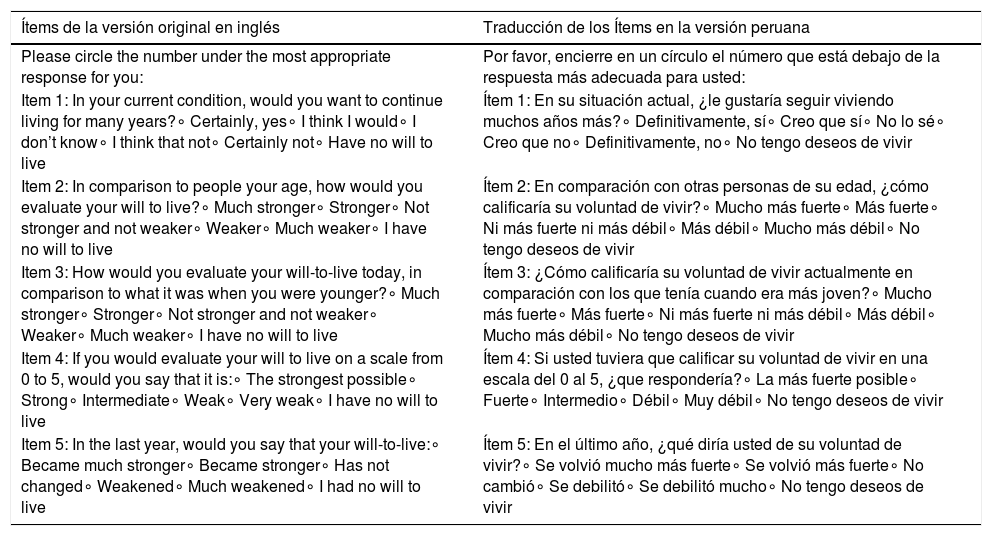La Will-to-Live Scale (WTLS) es utilizada para medir la voluntad de vivir en adultos mayores; sin embargo, no existe una versión en español. El objetivo del estudio fue traducir la WTLS al español, evaluar su estructura interna, su confiabilidad y los correlatos entre la WTLS y la satisfacción con la vida, la resiliencia y la depresión en adultos mayores peruanos.
MétodoLos participantes fueron 235 adultos mayores peruanos (M=72,69, DE=6,68) evaluados entre marzo y mayo de 2019, seleccionados a través de un muestreo no probabilístico. Se administró la WTLS, la Satisfaction with Life Scale (SWLS), la Brief Resilient Coping Scale (BRCS) y el Patient Health Questionnarie-2 (PHQ-2). El análisis de datos incluyó confiabilidad por consistencia interna y modelos de ecuaciones estructurales, específicamente el análisis factorial confirmatorio (AFC), para probar la solución unidimensional de la WTLS y la validez convergente de la WTLS a nivel latente, al especificar un modelo de cuatro factores (voluntad de vivir, satisfacción con la vida, resiliencia y depresión).
ResultadosEl coeficiente alfa de Cronbach y el índice de confiabilidad compuesto obtienen valores de 0,93 y 0,94, respectivamente. La estructura unidimensional de la WTLS se ajustó a los datos (χ2(5)=10,067, p=0,073, CFI=0,999, RMSEA=0,066, SRMR=0,014) y mostró asociaciones positivas con la SWLS (ρ=0,82) y la BRCS (ρ=0,86), así como negativa con el PHQ-2 (ρ=−0,66).
ConclusiónLa WTLS en español presenta evidencias de validez y confiabilidad para medir la voluntad de vivir en adultos mayores peruanos.
The Will-to-Live Scale (WTLS) is used to measure the will to live in older adults; however, there is no Spanish version. The objective of the study was to translate the WTLS into Spanish, assess its internal structure, reliability, and the correlates between WTLS and life satisfaction, resilience, and depression in older Peruvian adults.
MethodThe participants were 235 Peruvian older adults (M=72.69, SD=6.68), evaluated between March to May 2019, selected through non-probability sampling. The WTLS, the Satisfaction with Life Scale (SWLS), the Brief Resilient Coping Scale (BRCS) and the Patient Health Questionnaire-2 (PHQ-2) were administered. Data analysis included reliability by internal consistency and structural equation models, specifically confirmatory factor analysis (AFC), to test the one-dimensional solution of the WTLS and the convergent validity of the WTLS at the latent level, by specifying a four-factor model (will to live, life satisfaction, resilience and depression).
ResultsCronbach's alpha coefficient and the composite reliability index obtain values of .93 and .94, respectively. The one-dimensional structure of the WTLS was fitted to the data (χ2(5)=10,067, P=.073, CFI=.999, RMSEA=.066, SRMR=.014) and showed positive associations with the SWLS (ρ=.82), and BRCS (ρ=.86), as well as negative associations with the PHQ-2 (ρ=−.66).
ConclusionThe WTLS in Spanish presents evidence of validity and reliability to measure the will to live in Peruvian older adults.









